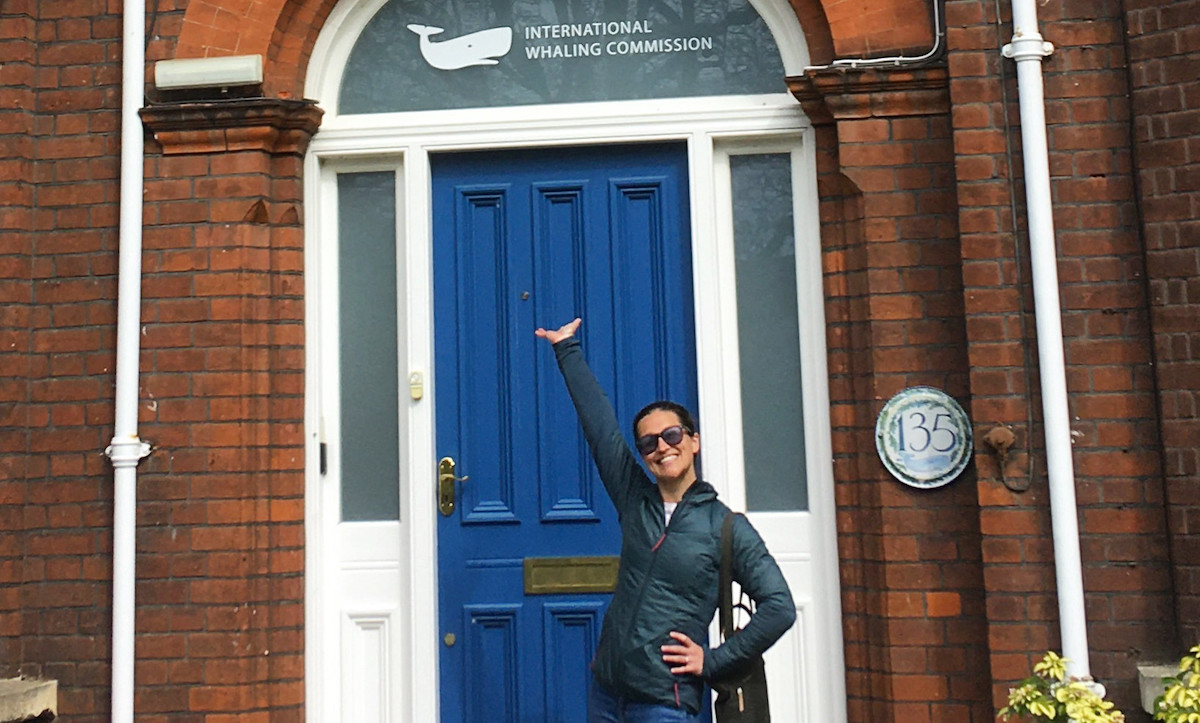Going from law to science and diplomacy, my Fulbright Schuman experience took me out of my comfort zone, challenged my leadership skills, and exposed me to some of the top marine mammal scientists in the world.
I began my Fulbright Schuman experience in September 2020… or I was supposed to. COVID- 19 put a halt to my plans, as it did to so many others. Despite the fact that my Fellowship was put on hold, I began to work remotely with my host institution, the International Whaling Commission (IWC) Office of the Executive Secretariat, which is based in Cambridge, England. I was slowly introduced to their work and staff, and the mission of the Commission, as I took on a few discrete projects, holding out hope that I would be able to physically travel to Cambridge.
Finally, after months of waiting, I departed, arriving in the U.K. in early April 2021.
Upon my arrival in Cambridge, I was thrown in full-time to IWC work. I began attending staff meetings and various calls with member countries from around the world. I was leading and supporting a number of work programs, including the Database of Recommendations, designing an internship program, and writing a report on the IWC’s carbon footprint. I helped the IWC team prepare for and conduct the virtual Scientific Committee meeting, which hosted over 550 participants, multiple simultaneous sessions, and countless papers, and took part in a somewhat controversial pre-SC Workshop on Ecosystem Functioning. I also began a months-long project supporting an indigenous people’s rights survey project for the Aboriginal Subsistence Whaling member country group, which connects with the work I do at my home institution. This work instilled in me diplomacy skills and challenged my notions of leadership in an international realm. It also exposed me to the vast range of viewpoints on whaling and whale conservation across the globe, which can often be seemingly subtle differences that could have major impacts to Commission programs and progress toward goals.
Not only was I able to gain exposure to international relations in cetacean and ocean issues, but I was also able to immerse myself in the culture of the United Kingdom. I took full advantage of my three months in the U.K, travelling across the country, meeting people, eating regional foods, and, once they were open, going to pubs! Each weekend I tried to visit a different part of the country by train, bike, and car (which was weird at first – driving on the other side of the road!). Besides exploring Cambridge extensively, I visited London, Norwich, York, East Sussex, Kent, Oxford, Bath, Bristol, the Peak District National Park, Dorset, Stonehenge, and Scotland.
My time in the U.K. was truly wonderful. I took away many lessons, both personal and professional, that will enhance my career path moving forward. I made professional contacts and good friends with whom I plan to keep in touch. And I am grateful for the experience despite the presence of and hardships caused by the global pandemic. I thank Fulbright Schuman for enabling this invaluable experience and the IWC Secretariat for the opportunity to join their team.
As a recipient of a 2020-2021 Fulbright-Schuman European Union Affairs Program Grant, Alisha Falberg will be conducting research and policy work for the International Whaling Commission’s Office of the Executive Secretariat. Her work will explore how this international organization pursues consensus in its whale conservation work, will examine the protection and use of the global oceanic commons, and will assist the IWC in this process. Alisha is an Attorney-Advisor with the National Oceanic and Atmospheric Administration, under the U.S. Department of Commerce.
ARTICLES ARE WRITTEN BY FULBRIGHT GRANTEES AND DO NOT REFLECT THE OPINIONS OF THE FULBRIGHT COMMISSION, THE GRANTEES’ HOST INSTITUTIONS, OR THE U.S. DEPARTMENT OF STATE.


